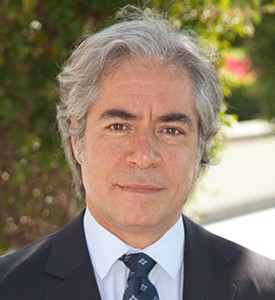
“Both the government and the industry have great ambitions to make the Turkish pharma industry a leading global player. However, achieving this objective will necessitate increased R&D spending and investments into new technology, which in turn requires sufficient profitability and capital accumulation.”
By Agostina Da Cunha
Turgut Tokgöz
SECRETARY GENERAL, IEIS
The Pharmaceuticals Manufacturers Association of Turkey (IEIS) has a history dating back to 1964. Could you briefly give us an overview of IEIS’s mandate and evolution, identifying the key role that the association plays in the industry and its vision for the future?
IEIS has been contributing to the development of healthcare policies since 1964. We have 55 national and multinational members.
We cater to a diverse group of companies with different business interests stretching from the production and imports of medicines as well as APIs. In this context, we are effectively involved in all areas of the pharmaceutical industry and assume an important role in the establishment of healthcare policies. We are an influential partner to policymakers in the creation of legislation.
Our aim is to create a better ecosystem for R&D, innovation and value-added manufacturing that will strengthen the position of the Turkish pharmaceutical industry in the global market.
IEIS has developed new platforms, including its biotechnology platform and its exports platform. Would you like to elaborate on the need to bring together industry players under these umbrellas?
Turkish Pharmaceutical Exporters Platform was established by IEIS in 2012 with the aim to promote the industry’s high standards in international markets and increase its competitiveness to make it a leading exporter in the global market. Our platform has 24 members today. Since its founding, we have been working diligently to promote our powerful and advanced pharmaceutical industry in international markets.
As a result of such efforts and the synergy created under the platform, pharmaceutical exports have been rising steadily. Turkey's pharmaceutical exports have reached US$1.2 billion in value.
As a rooted and leading association in our industry, we also established the Turkish Biopharmaceuticals Platform at the end of 2016 with the aim of creating synergy in the field of biotechnology. The Platform is comprised of 23 companies that have activities in this field. The platform is working diligently to make Turkey a leading player in the highly competitive biotech space. Our efforts and activities are focused on creating a favorable regulatory environment, establishing an effective incentive scheme and attaining a qualified workforce.
IEIS represents members with a stake in manufacturing, and the impending localization policy is specifically related to the place of manufacturing. What impact do you expect this policy will have in terms of the dynamic between local and foreign players?
One of the most important issues on the agenda of our industry in recent years has been domestic production. As IEIS, becoming a global pharmaceutical production center is a priority. Within this scope, we wholeheartedly support localization and technology transfers.
Turkey’s localization efforts under the leadership of the Ministry of Health over the last three years have produced many positive outcomes. During this process, the industry invested in new technologies, increased capacity utilization and employment while imports diminished. Long-term manufacturing contracts are also focusing on pharmaceutical exports.
IEIS deems the continuation of localization policies is of great importance for our industry and therefore we support them.
The elephant in the room when discussing pharmaceuticals in Turkey is price policy. The government exercises initiatives to boost growth in pharma and biopharma whilst holding prices down through the cross-referencing system. How can sustainable access to healthcare be reconciled with the needs of the industry?
Needless to say, the government’s pricing policies for the last ten years have not been constructive for the industry. The expansion in the social security coverage and improvement in health services paving the way for higher accessibility to pharmaceuticals has come at the expense of the industry. The resulting increase in public pharma spending has been curtailed by severe price controls.
Both the government and the industry have great ambitions to make the Turkish pharma industry a leading global player. However, achieving this objective will necessitate increased R&D spending and investments into new technology, which in turn requires sufficient profitability and capital accumulation.
Thus, we definitely need a more balanced and sustainable approach from policymakers.
Biotech is a key point on the national agenda and the sector promises new generations of medicines that could revolutionize healthcare. What prospects are in line for Turkey to become a biotech hub given these considerations? What do you believe to be the decisive factors in the upcoming years for Turkish pharma and biopharma?
Very impressive investments have been made in the field of biotechnology in the last three to four years. Companies are working hard to enter the global biosimilars market with a long-term perspective. Given the rooted pharma production culture, we believe that Turkey will also be successful in this field.
The pipeline of companies active in biotech suggests that 39 products will be marketed by 2024. Companies have different business models from fill & finish to cell line development. Some companies rely on public R&D funds offered by public institutions like TUBITAK and TUSEB. Some have cooperations with foreign companies leading to technology transfers. We also have companies carrying out successful projects with start-ups and university partnerships.
In order for Turkey to compete effectively with its competitors in this field, a supportive ecosystem needs to be established. Enhanced licencing regulation that will shorten time-to-market is of utmost importance. New incentive schemes geared towards more public funding would be of help. New patients should be encouraged to begin treatment with biosimilars produced in our country.
How can Turkey inoculate an R&D mindset to differentiate itself through value-adding drugs in world markets?
The importance of value-added generics is increasing around the world. Turkey’s production capacity and know-how provides the basis for becoming an important supplier of such products. Our companies are capable of step-up innovation to carry existing products to a next level.
These products, which enhance patient and treatment compliance, have many pharmacological benefits and therefore offer higher value added. Thus, local reimbursement prices for such products should take into account the higher value added. I believe Turkey can be an important exporter of such products in the future.










